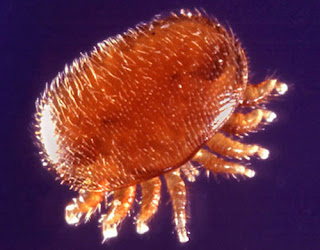 |
| The Varroa destructor mite. |
The objective of my project is to evaluate the consequences of pesticide exposure on colony growth and brood production, forager activity, and colony homeostasis to determine if pesticides are indeed having a detrimental effect on honeybees’ well-being. I intend to monitor the vital signs of two colonies exposed to miticides (with two given blank miticide strips and another two with nothing at all) using temperature, humidity, weight, and CO2 sensors, with the help of William Meikle at the Carl Hayden Bee Research Laboratory in Tucson. I am very excited for my project- if all goes well I will have some neat results. I'm going in on Monday to familiarize myself with the CO2 sensors, and we will be installing the sensors on Wednesday. I will post updates as they happen, but I 'hive' to go now; we'll talk again soon.
